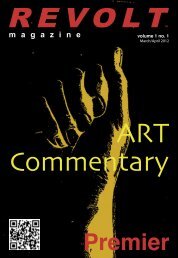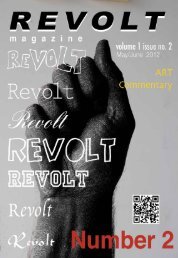Download PDF Version Revolt Magazine, Volume 1 Issue No.4
Download PDF Version Revolt Magazine, Volume 1 Issue No.4
Download PDF Version Revolt Magazine, Volume 1 Issue No.4
You also want an ePaper? Increase the reach of your titles
YUMPU automatically turns print PDFs into web optimized ePapers that Google loves.
to you, telling you, ‘This is how you should read<br />
this,’ or ‘This is what this is about.’ But through<br />
various disguising and transformative elements,<br />
it can impart these political messages or any sort<br />
of message. Art should never hammer things over<br />
people’s heads. If that’s happening, then that’s<br />
a problem…A lot of political theatre veers in and<br />
out of this aggressive performance art that has<br />
on the tip of its tongue, ‘This is the dogma’ or<br />
‘This is the dictum.’ I don’t think that really honors<br />
the nature of what theatre is. Basically how I<br />
feel with the arts is this: ‘Take an art. Figure out<br />
what that art’s good at. And once you’ve figured<br />
out what that art is good at, then you can blend<br />
it with another element.’ That’s my feeling about<br />
multimedia theatre as well. That’s my feeling about<br />
circus theatre, for example. That’s my feeling about<br />
political theatre.<br />
How do you reconcile the personal dialogueoriented<br />
method of social theatre with the<br />
political initiative of your programs?<br />
Reka: When I was trained in social theatre for my<br />
Masters degree, there was a whole class there<br />
on the ethical dilemmas of taking funding from<br />
various organizations. Obviously the aim of social<br />
theatre is not to take a political vocabulary and<br />
set of ideas and push that forward. So it becomes<br />
problematic when you get funded by a certain<br />
funding body. But it’s really a case-by-case thing. In<br />
many cases it’s about taking the money and doing<br />
the work, but kind of negotiating some way around<br />
their demands. I was very lucky in the sense that<br />
the UN pretty much gave me full reign. They said<br />
it needed to be around the theme of sexual health<br />
because of their funding. So I tried while we were<br />
devising themes to bring up some sexual health<br />
questions – not even criteria, but questions – to<br />
see how the group reacted. But they were actually<br />
a lot more concerned with gender roles, which<br />
could relate. And that’s what I mean by negotiating.<br />
It can relate, but it’s not only about sexual health.<br />
I have a fiscally sponsored organization called<br />
Fronteirra. And the funding that we’re looking for,<br />
what I’m looking for is really around immigration<br />
issues. So, it’s really about informative projects<br />
around the immigration reform that’s happening<br />
right now, about strengthening the immigrant<br />
community…So, there’s already that focus. But<br />
then afterwards, what the issue is, what themes<br />
they want to discuss are up to group<br />
What is your take on social theatre?<br />
Adam Willson: In general, social theatre is<br />
basically using theatre to build community<br />
mobilization. The idea is to get together a group<br />
and have them focus on their story, whatever that<br />
story is. And I like the premise of it. But I think<br />
it’s maybe a little too utilitarian for me. It seems<br />
the goal is to use theatre as a way to implement<br />
education. And I think a strong element in theatre<br />
is education, but not the only element. Also, I’m a<br />
little skeptical of democracy. I’m skeptical because<br />
REVOLT<br />
I believe that once you get so many voices in a<br />
room, first of all it’s going to be hard to come to<br />
some sort of consensus. But also I think there’s<br />
this idea that when you allow so many voices –<br />
and basically in a certain sense, you’re trying to<br />
take the average voice of the group – what ends<br />
up happening is you lose sight of the best and<br />
the worst…And I’m worried that democracy in the<br />
arts or otherwise tends to facilitate mediocrity. If<br />
you’re only focusing on community devisement, I<br />
think you’re losing sight of the possibility of actually<br />
creating a masterpiece. I think a masterpiece could<br />
come out of that sort of methodology. But at the<br />
Photo courtesy of Frontierra Theatre Group.<br />
same time, I can see how quite often it doesn’t…I<br />
very much appreciate that social theatre is being<br />
done. And I appreciate that there are governing<br />
bodies or NGOs or whatever who are funding these<br />
projects. But at the same time, by basically taking<br />
these sequestered groups or differentiated groups<br />
and working with them on particular issues, with<br />
a specific goal in mind, for a specific time, I think<br />
it could end up cramping these groups’ abilities to<br />
actually express themselves in a free way. Theatre<br />
is a serious business. All art is a serious business,<br />
and I think a lot of people who don’t do art don’t<br />
realize how serious it is. If you want to do good<br />
stuff artistically, it takes a lot of fucking work, and<br />
it takes a lot of fucking focus…Without the proper<br />
preparation and training, I’m worried that these<br />
workshops might prevent people from really seeing<br />
what theatre is about. But that may not be the<br />
worst thing in the world. After all, it’s getting them<br />
out and performing. So, I can’t knock it too much.<br />
I’m just talking about my concerns.<br />
How would you characterize the difference<br />
between social theatre and conventional<br />
theatre?<br />
Reka: Over the weekend, I watched Farrah Crane’s<br />
play called ‘Night.’ It takes place in Lebanon in<br />
wartime. It’s a very strong piece and very well<br />
written. It was performed by lovely actresses but<br />
who, as far I know, have had no experience of<br />
war. And they’re performing for people who, just<br />
like them, have generally had no experience of<br />
war. That doesn’t mean it was less interesting.<br />
But in my head, as a social theatre practitioner,<br />
it’s like what’s the point? I mean it’s interesting,<br />
but it’s something that’s not legitimate – it loses<br />
something. I feel like we’re taking advantage of<br />
a dramatic situation, and it’s like ‘Oh, something<br />
terrible is happening over there, and let’s make a<br />
piece about it.’ And we feel bad about something<br />
we have nothing to do with and have never<br />
experienced and don’t know about…<br />
But I don’t have some of the experiences of the<br />
groups I’m working with, and that’s a conflict too.<br />
The way I was introduced to theatre was also as a<br />
bystander…But at the same time, it got me where<br />
I am…So it’s an ethical wheel. For me and a lot of<br />
the colleagues of mine, I came from a middle-class<br />
background. I have had no traumatic experiences.<br />
So, I come into this field like ‘Yes! Change! It’s<br />
good!’ Because I have the privilege of being able to<br />
think for myself. My hands are not tied.<br />
I remember a specific incident where I was faced<br />
with this veil I have over my head. I was working<br />
with a homeless group, co-facilitating. We were<br />
doing a forum piece in a homeless shelter. There<br />
was this piece about a recovering alcoholic. There’s<br />
this recovering alcoholic who’s 9 months sober<br />
in the beginning. She’s doing great. She wants to<br />
give back to society. She works with refugees as a<br />
volunteer. But then there’s this one refugee whose<br />
case gets worse and worse, and this individual<br />
can’t help. So she starts drinking and drinking and<br />
drinking. By the end of the piece she’s so drunk, on<br />
the floor, and this refugee friend comes knocking<br />
on the door and says, ‘I have nowhere to go. Can I<br />
stay here?’ And the character says ‘Ah! Sorry, no!<br />
Just go! I can’t help you’<br />
Then we asked the audience, ‘Is there any point in<br />
the play where you would’ve said or done anything<br />
different?’ One person said, ‘Yeah. It’s the last<br />
thing, I’d change something right there.’…So, the<br />
spectator comes up and replaces the character of<br />
the recovering alcoholic. The refugee friend knocks<br />
on the door, it opens, and the guy says ‘yeah come<br />
on in, come on in.’ They both sit down on the<br />
bench for 30 seconds completely silent, and then<br />
the guy who intervened, he takes this big bottle of<br />
whiskey and asks, ‘do you want some?’ And the<br />
actor shrugs and says, ‘Yeah.’ That’s it. And they<br />
just drink on this bench for 30 seconds. Everyone<br />
claps, and we ask, ‘so what was that all about? Did<br />
that change anything?’ The guy who intervened<br />
said, ‘Yeah, totally. I mean I’m in the shit. She’s<br />
in the shit. Might as well be in the shit together.’<br />
For me it was a great shock…It’s a beautiful idea<br />
that I would not have thought of, because I’m with<br />
this sort of background. I was brought up with the<br />
opportunity to make a difference. My parents were<br />
fighters. So I had a very active kind of upbringing…<br />
where you can’t just take something for granted –<br />
no, you have to move forward. And that’s a luxury.<br />
It really is. But sometimes it’s about being rooted<br />
in the present, and taking the moment for what it<br />
is. Work on the now. I’m still learning constantly.<br />
I have a lot to learn about conventional theatre as<br />
well.<br />
<strong>Magazine</strong> Number 4, 2013 34





